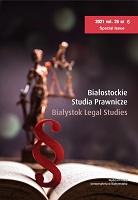The Juvenile Reentry Mentoring Project: Adaptations During COVID-19
The Juvenile Reentry Mentoring Project: Adaptations During COVID-19
Author(s): Anne Hobbs, Marta DzieniszewskaSubject(s): Education, Criminal Law, Health and medicine and law, Demography and human biology, Penal Policy, Pedagogy
Published by: Temida 2
Keywords: COVID-19; evidence-based; juvenile justice; mentoring;
Summary/Abstract: Delinquent youths often do not receive the opportunity to be mentored. This is especially true for youths who have committed serious law violations or are detained for multiple law violations. In the United States, youths with the most serious offenses are often committed to detention, or rehabilitation, or treatment centers. Since 2011, the Juvenile Reentry Mentoring Project (JRMP) has matched mentors to youths detained in Nebraska Detention, and Treatment Facilities. The Nebraska Youth Rehabilitation, and Treatment Centers (YRTCs), specifically, are for youths with the highest level of needs and who have exhausted all other programs available in the community. From 2011 through February 2020, the JRMP developed as an evidence informed model for mentoring juveniles with the highest level of need and the most serious law violations. The onset of the COVID-19 pandemic disproportionately impacted youths in detention and treatment centers, and mentoring programs such as the JRMP adapted to continue to meet existing and emerging needs of youths. The aim of this article is to report on the evidence-based development of the JRMP and the adaptations that were necessary for it to continue to operate during COVID-19. We close with recommendations and lessons learned from the pandemic and ways that programs can resist a return to the status quo.
Journal: Białostockie Studia Prawnicze
- Issue Year: 26/2021
- Issue No: 6
- Page Range: 127-144
- Page Count: 18
- Language: English

